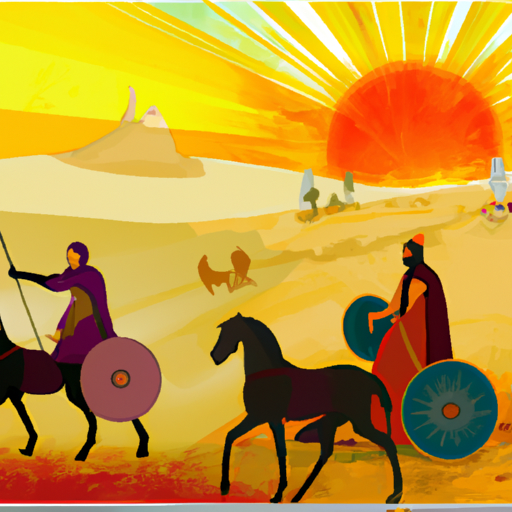A Brief History of Egypt’s Fall to Islam
Delve into a mysterious past and discover the momentous event that changed Egypt forever. Unearth the secrets of when a new religion swept in, leaving an indelible mark on the country’s culture. Uncover the story of when Egypt fell to Islam and explore its far-reaching effects that still reverberate today.

An unfathomable saga, one of the most spellbinding in the world, is that of Egypt. It is a narrative of fluctuating religions, potent rulers, and monumental events that have formed the culture and nation for centuries. In 641 AD, Muslim forces under ‘Amr ibn al-‘As conquered it, initiating a new faith and lifestyle for Egyptians with repercussions still felt today.
The introduction of Islam brought about tremendous changes to Egyptian society. Christianity was supplanted by the Islamic faith while Arabic became the official language. Governmental organizations were adjusted to mirror Islamic values such as Sharia law being employed as the main legal system. Other aspects of life were also impacted by this transformation; education and architecture began to incorporate Islamic designs and symbols.
The effect of Islam on Egypt has been immense and continues to reverberate in modern times. While numerous facets remain unchanged since its arrival over a thousand years ago, there have been numerous developments over time that have helped shape it into what it is today – from religious practices to political systems – Islam has had an undeniable influence on Egyptian culture throughout its long history.
.
Introduction

A bewildering event in history, the conquering of Egypt by Muslim Arabs in 639 AD, led by Amr ibn al-As, ushered in a new Islamic era. This period saw an array of modifications to Egyptian society and culture, with Islam becoming the predominant faith and Arabic being adopted as the official language. Furthermore, Egypt emerged as a major center for Islamic scholarship and learning, with Cairo emerging as a key hub for academics from all over the globe. The Islamic era in Egypt lasted until it was incorporated into the Ottoman Empire in 1517.
– History of Egypt’s Conversion to Islam
For centuries, Egypt has been the subject of curiosity concerning its transformation to Islam. In 639 CE, Arab forces invaded and conquered the region, bringing with them the teachings of Islam. This event sparked a surge of conversion to the new religion among Egyptians, leading to an official declaration of it as the state religion in 642 CE. Mosques were erected across the country and Islamic schools were founded to spread knowledge of the faith. Gradually, Islam started replacing Christianity as the main religion in Egypt. By 750 CE, most Egyptians had adopted some form of Muslim belief system and practices. Presently, Muslims make up roughly 90% of Egypt’s population, making it one of the most populous Muslim nations in the world.
– The Impact of the Islamic Conquest on Egyptian Society
A wave of bewilderment swept across Egypt in the 7th century, as the Islamic Conquest transformed its political and religious landscape and altered its economy and culture. The Arab Muslims established a caliphate, replacing Byzantine rule with an Islamic state that unified the region under one law. As Islam spread throughout Egypt, mosques became hubs of worship and study, while Arabic replaced Coptic as the language of prayer.
Foreign trade flourished due to Egypt’s strategic location between Africa and Asia, bringing in a surge of money that stimulated economic growth and development. People from all over the world began to settle in Egypt, diversifying its population even further. Artistic styles such as calligraphy were adopted from other Muslim societies while traditional forms such as hieroglyphics were preserved but adapted to fit an Islamic context. Literature also flourished during this period, with works such as Al-Maqrizi’s History of Egypt still studied today.
It is evident that the Islamic Conquest had a tremendous impact on Egyptian society, leaving an indelible mark on modern-day Egypt.
– The Role of Arab Tribes in the Islamic Conquest of Egypt
A pivotal event in history, the Islamic Conquest of Egypt in the 7th century saw the participation of various Arab tribes. Led by Amr ibn al-As, dispatched by Umar ibn al-Khattab, the second caliph of Islam, and accompanied by thousands of troops from Arab tribes such as Banu Judham, Banu Abs and Banu Sulaym, this invasion was a success due to their invaluable contributions. Not only did they provide military aid and financial assistance for the campaign, but also introduced new cultural elements into Egyptian society. Arabic became the official language of Egypt, while religious practices such as prayer times and fasting during Ramadan were also brought to light. To this day, these Arab tribes’ influence on Egyptian culture can still be felt.
– The Spread of Islamic Culture and Practices in Egypt
Throughout the ages, Egypt has been a hotbed of Islamic culture and practices. From the Fatimid Dynasty’s arrival in 969 CE to the Ottoman rule of 1517-1805 CE, many rulers have sought to propagate Islamic teachings across the country. This influx of new customs, art, literature, law and language has left a lasting impression on Egyptian society today.
The Ayyubid Dynasty (1171-1250 CE) saw Cairo become a major center for Islamic scholarship and learning. Famous religious schools such as Al-Azhar University and Dar al-Hadith al-Ashrafiyya were established here and played an integral role in disseminating knowledge throughout Egypt and beyond. The Mamluk Sultanate (1250-1517 CE) also saw an increase in public works projects – mosques, madrasas, libraries, hospitals and schools – that helped promote Islamic learning around the country. Trade with other Muslim nations was encouraged to facilitate cultural exchange between different parts of the Islamic world.
Finally, during Ottoman rule there was a strong focus on spreading Islam throughout Egypt; sharia law, prayer times and dietary restrictions were all introduced by the Ottomans in order to bring Egyptian society more closely into line with traditional Islamic values. Numerous mosques were built across Cairo and other cities to further encourage religious observance amongst Egyptians.
In summation, it is clear that Islam has had a deep impact on Egyptian culture over time; from its architectural monuments to its educational institutions dedicated to advancing knowledge about this religion – it is without doubt that this faith has made an indelible mark on history and society today.
– Examining the Legacy of the Islamic Conquest in Modern Day Egypt
A profound shift in Egypt’s identity was brought about by the Islamic conquest of the 7th century CE, leaving an indelible mark that is still evident today. Buildings like the Citadel and Ibn Tulun Mosque in Cairo are a testament to the transformation of the cityscape during this period, while smaller structures featuring traditional Islamic designs and motifs can be found scattered throughout. Religion, too, has been profoundly shaped by Islam’s presence over time, with Sunni and Shia interpretations of faith practiced by most Egyptians and holidays such as Eid al-Fitr and Eid al-Adha widely celebrated each year. Arabic has also become an integral part of Egyptian culture, used for both everyday conversation and scholarly pursuits when studying ancient texts from this era. It is clear that, even centuries later, Islam continues to have a pervasive influence on all aspects of life in modern day Egypt – making it impossible to overlook its legacy when examining contemporary society.
conclusion

Mysteriousness and tumult pervade the annals of Egypt’s past, with a momentous event taking place in the 7th century AD. The Arab Muslims descended upon the land, initiating a conquest that would ultimately culminate in 641 AD when Amr ibn al-As declared it part of the Islamic Caliphate. Since then, this region has been predominantly Muslim.
.
Some questions with answers
1. When did Egypt fall to Islam?
Egypt fell to Islam in 639 AD.
2. Who was the leader of Egypt at the time?
The leader of Egypt at the time was Amr ibn al-As, a companion of the Prophet Muhammad.
3. What religion did they convert to?
The Egyptians converted to Islam, a monotheistic faith based on the teachings of the Prophet Muhammad.
4. How did this change affect Egyptian culture?
The conversion to Islam had a major effect on Egyptian culture, as it brought with it many new religious and cultural practices, such as Islamic architecture and art, as well as a new language (Arabic) and legal system (Sharia law).
5. What is the significance of this event in history?
The fall of Egypt to Islam marked an important moment in history, as it was one of the first major countries to adopt the religion and set an example for other nations in terms of its acceptance and spread throughout the world.




